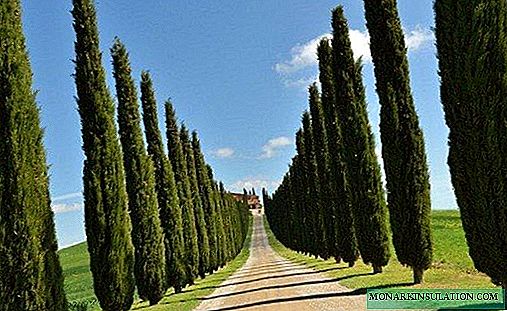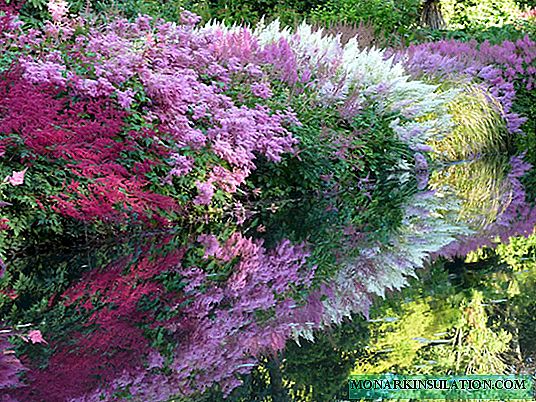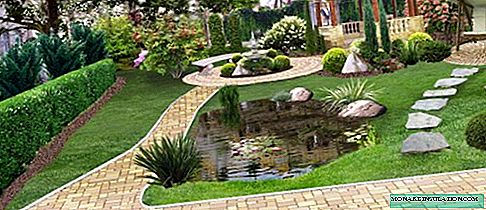
Having bought the long-awaited piece of suburban land, do not rush to explore new territories. In order for the costs to be minimal, the results are effective, and the appearance of the site is original and noble, it is necessary to prepare for practical actions by drawing up a detailed plan. Preliminary layout of the site includes the assessment of land resources, division into zones, the choice of landscape style and the preparation of a detailed layout of the house, garden and other significant objects.
Proper assessment of planning factors
Determining the location of the house, beds, flower beds and additional buildings, you must first make sure that the delimitation of the territory. As a rule, the boundary of the site often coincides with the fence, which is erected in the first place.
Removing borders by coordinates
Only geodesic surveys will help to precisely mark the boundaries of the territory or restore lost data about their location. Initially, the marking of the land by coordinates is entered in the cadastral passport, therefore, in the absence of data, a request should be made to the cadastral chamber. Using an extract with the exact coordinates of the borders, specialists indicate certain points. Now these events are held using GPS devices or an electronic total station, which guarantees high accuracy of the information. The designation of the boundaries occurs with the help of various methods of surveying, the simplest of which is the installation of small stakes with twine stretched between them.

Proper development of the project and the preparation of a detailed scheme will help to rationally arrange buildings, landings, communications in the country and to avoid alterations
Clarification of the boundaries will help in the future to sell or donate the land without any problems, as well as get rid of the claims of neighbors and correctly fix the fence.
Consideration of natural characteristics
Before planning, in addition to the size and shape of the territory, it is important to pay attention to the following features:
- relief;
- groundwater;
- soil type;
- lighting;
- a rose of winds.
The choice of the location of the house and garden, the types of communications, the definition of the landscape style depend on the terrain - plain or hilly. If there are ravines, ditches or natural ponds at the cottage, this should also be noted when drawing up the scheme.
The soil structure affects the choice of plants for the site, since not all vegetables, fruit trees, or flowers develop on sandy, clay, loamy, humus soils.
You can find out what soil fertility depends on from the material: //diz-cafe.com/ozelenenie/ot-chego-zavisit-plodorodie-pochvy.html

One of the options for arranging a summer cottage in a regular style: a flat relief, the house is in the center, bordered by a recreation area and surrounded by decorative green compositions
Measures related to the installation of drainage facilities, a well or a well, as well as the choice of methods for discharging stormwater, are associated with the level of groundwater. The groundwater level also affects the productivity of fruit trees.

The groundwater level can be determined independently in the process of constructing wells or digging a well by drilling, as well as using old points of water intake
Data on the light and wind rose will help to correctly install the cottage, place a garden and a kitchen garden, and correctly choose the types of plants.
Division of land into zones
In addition to the designation of the external borders of private property, there is an internal marking of a personal or garden plot. Usually it is called zoning, since the whole territory is conditionally divided into several main zones:
- residential;
- for relax;
- gardening;
- business service.
Approximately 10-15% of the area is allocated for building - cottage, summer kitchen, utility rooms, gazebos, garage, pool, etc. About 15% is given to internal communications (paths, parking, driveway) and landscaping (flower beds, flower beds, rockeries, hedges). The lion's share, about 70-75%, belongs to the garden and the vegetable garden (in various proportions).

Zoning of the site takes place in any form: some zones are mandatory (residential, entry, recreation), others may be lost (parking, children’s, lawn)
The fundamental object is the house, so it is from it that zoning should begin. Outbuildings should be close to a residential building and at the same time hide from the eyes, for example, in decorative thickets. The beds and flower beds must be located in the lighted area, and plants that love the shade - near the house or in the garden. Some fruit bushes (currants, raspberries, gooseberries) tolerate partial shade, so they can be planted along the fence or on the shady side of buildings. The recreation area depends on the preferences of the owners of the cottage: it can be the area around the pool, a cozy semi-open gazebo or an expanded children's playground. The main thing in zoning is to follow the principles of rationalism and practicality.
Choosing a landscape planning style
The general perception of a summer cottage territory depends on the chosen style. What will she look like? Perhaps these are wild thickets of fruit and ornamental plants with a small cozy house hidden inside them. Or maybe a beautiful stately cottage, surrounded by a scattering of flower beds and straight paths like arrows. There is a simple and affordable division into 3 basic styles, which will help to understand how to correctly mark the site.
A free online garden plot designer will help you plan your plot: //diz-cafe.com/planirovshhik.html
Landscaping - natural naturalness
All elements of the landscape are arranged according to the principle of naturalness, which does not recognize clear and straight lines, symmetry and regularity of forms. Garden trees are arranged in a free order, winding paths curl between them, a brook sparkles, flower groups resemble bright forest lawns rather than organized flower beds. Everything looks natural and picturesque.
The break of the ravine, the irregular shape of almost natural reservoirs, unexpected elevations - all this should indicate that the main artist in this territory is not man, but nature itself. Even the material of the tracks should be as natural as possible - stone, pebbles, sand.

One of the original landscaping solutions is an oriental-style garden. Mandatory elements are a pond, wooden bridges, water and land plants, planted in random order
More Chinese-style garden ideas: //diz-cafe.com/plan/sad-v-kitajskom-stile.html
Regular - Correct Geometry
A flat topography is ideal for landscaping in a regular style. All objects are subject to the principles of geometry: straight paths, flower beds rectangular, oval or round, the bush is planted in even rows or symmetrical compositions. Ponds, like platforms, also have clear boundaries and a certain shape. Often, small design elements line up along a conditional axis or around a given center.

An example of using a regular style is a cottage surrounded by floral decor. The central location of the building, symmetrically planted flower beds and trees are signs of the English style.
The main elements of the English style: //diz-cafe.com/vopros-otvet/angliyskiy-sad-landshaftnyiy-dizayn.html
Mixed - Intelligent Chaos
Mixed style is the most popular among summer residents, as it provides more opportunities for building and landscaping. Some elements (beds, garden trees) are arranged in a certain order, while others (paths, flower beds, buildings) are random. The result is a cozy, neat, vibrant country corner for working in the garden or for a Sunday holiday.

A perfect example of mixed style in the L-shaped section. The house and the bath are arranged asymmetrically, some of the plants are planted in a chaotic manner, the other part in even rows
One example: a country-style garden //diz-cafe.com/plan/sad-i-dacha-v-stile-kantri.html
Territory drawing up rules
Having examined in detail how best to mark the boundaries, you can begin to draw up a diagram. For convenience, you can use a large sheet of checkered paper or graph paper, on which each square meter is 1 square centimeter, that is, the scale will be 1: 100. Large objects - a house, a bathhouse, beds, greenhouses, flower beds, a pool, a garage, fruit trees - can be cut out of colored paper and freely moved around the working field. Sometimes during such experiments new interesting ideas appear.

Particular attention when planning requires areas of non-standard, elongated shape. To give them a more picturesque look, they use optical barriers and dividers in the form of beds, ponds, mixed compositions
When placing elements in the center or along the edges of the site, it is necessary to remember the sanitary and fire safety standards, as well as the features of the terrain. There is such a thing as a dendroplan - it will not hurt either.

The scheme of minimum distances from summer cottages to the border of the neighboring plot, which must be observed during the construction or improvement of the territory
It will simplify further activities and indicate the location of electrical, sewer and water pipelines, including underground ones. A self-made plan can be presented to a licensed organization to draw up an official plan, which is agreed upon by government agencies, as well as used in working with designers, builders, architects.











